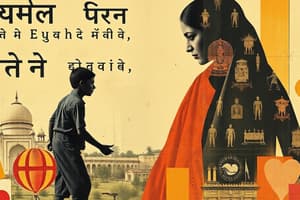Podcast
Questions and Answers
What script is used for writing Hindi, Sanskrit, Marathi, Nepali, and several other languages?
What script is used for writing Hindi, Sanskrit, Marathi, Nepali, and several other languages?
- Katakana script
- Hangul script
- Devanagari script (correct)
- Cyrillic script
Which poets contributed to the growth of Hindi during the medieval period?
Which poets contributed to the growth of Hindi during the medieval period?
- Bharavi and Magha
- Surdas and Kabir (correct)
- Kalidasa and Bhavabhuti
- Tulsidas and Mirabai
In which centuries did Hindi start to rise as a modern literary language?
In which centuries did Hindi start to rise as a modern literary language?
- 10th and 11th centuries
- 17th and 18th centuries
- 19th and 20th centuries (correct)
- 15th and 16th centuries
What role does Hindi play in daily life for many Indians?
What role does Hindi play in daily life for many Indians?
Why has Hindi been a source of controversy in Indian politics?
Why has Hindi been a source of controversy in Indian politics?
Study Notes
Exploring Hindi: A Comprehensive Look at India's Most Widely Spoken Language
Hindi, an Indo-Aryan language, is the most widely spoken language in India and is a part of the daily lives of hundreds of millions of people. As we delve into this rich and vibrant language, let's explore its origins, distribution, history, and role in modern India.
Origins and Family
Hindi is related to other Indo-Aryan languages such as Urdu, Punjabi, Bengali, and Marathi, all of which are descendants of the ancient Sanskrit language. Hindi is considered the standardized and modern form of the Vrati dialect, which emerged around the 10th and 11th centuries CE in the western part of the Gangetic plain.
Variations and Dialects
Hindi has several dialects, including Braj Bhasha, which is often considered the original form, and Awadhi, which is spoken in parts of Uttar Pradesh. Other dialects include Chauthi Bhasha, Bundeli, and Bagheli. These dialects exhibit differences in pronunciation, grammar, and vocabulary but share a common core and understanding.
Geographic Distribution
Hindi is the official language of seven states: Madhya Pradesh, Uttarakhand, Uttar Pradesh, Bihar, Jharkhand, Chhattisgarh, and Haryana. It is also recognized as an official language in several other states and union territories, indicating its widespread usage throughout India. Hindi is also one of the 22 scheduled languages of India and the official language of the central government.
Writing System
Hindi is written in the Devanagari script, which is also used for writing Sanskrit, Marathi, Nepali, and several other languages. The Devanagari script is read from left to right, and its letters are made up of simple geometric shapes.
Hindi Literature
Hindi literature has a rich history dating back to ancient times. Early works include religious texts and poems, such as the Ramayana and Mahabharata. During the medieval period, poets such as Tulsidas, Surdas, and Kabir wrote in Hindi, contributing to the growth of this language.
The 19th and 20th centuries saw the rise of Hindi as a modern literary language, with poets such as Mahadevi Verma, Suryakant Tripathi Nirala, and Harivansh Rai Bachchan shaping its modern form. Today, Hindi literature encompasses a wide variety of genres and styles, including poetry, prose, drama, and fiction.
Hindi in Modern India
Hindi plays a crucial role in the daily lives of millions of Indians, serving as a medium of communication, education, and entertainment. Hindi newspapers and magazines are widely circulated, and Hindi films, television programs, and music are popular throughout the country. Hindi is also one of the 23 official languages of the United Nations and is widely spoken in countries such as Nepal, Mauritius, Fiji, and South Africa.
Hindi and Politics
Hindi has often been a source of controversy and debate in Indian politics. Some argue that the promotion of Hindi may lead to the marginalization of other Indian languages and cultures. However, others view Hindi as a unifying force, bringing together speakers from diverse linguistic backgrounds.
Hindi Learning Resources
For those interested in learning Hindi, there are numerous resources available, including textbooks, language learning apps, and online courses. Duolingo, Babbel, and other popular language learning apps offer Hindi courses, while online platforms such as Coursera and edX offer free and paid Hindi language courses. Additionally, Hindi language learning books and resources are widely available in bookstores and online.
In conclusion, Hindi is a fascinating and complex language with a rich history and widespread usage throughout India and beyond. Its diverse dialects and literature are a testament to the vibrant and dynamic Indian culture, and its role in modern India is an essential one. Whether you're interested in learning Hindi for personal or professional reasons, there are numerous resources available to help you master this language and deepen your understanding of Indian culture and history.
Studying That Suits You
Use AI to generate personalized quizzes and flashcards to suit your learning preferences.
Description
Delve into the rich and vibrant world of Hindi language, exploring its origins, variations, dialects, geographic distribution, writing system, literature, role in modern India, and political significance. Discover resources for learning Hindi and appreciate its cultural importance.



